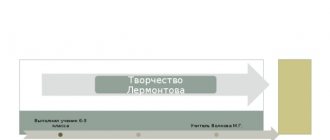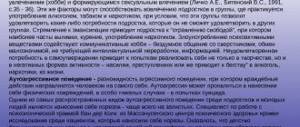Chapter 2. Application of mathematical knowledge in the profession “Cook, confectioner”
Introduction.
Knowledge of mathematics is needed by all inhabitants on Earth, but still some representatives of our profession simply need it: to correctly calculate a recipe, to cut at the right angle...
The study of mathematics develops logical thinking, accustoms a person to accuracy, to the ability to see the main thing, and provides the necessary information for understanding complex problems that arise in various fields of activity of a modern person, in this case in choosing a future profession.
We encounter mathematics every day! At school, on the street, in shops and even at home.
In modern life, when even an ordinary person is increasingly dependent on the application of science and technology in daily activities, the role of mathematics is very important. A person makes even the simplest calculations unconsciously, without thinking that he is using mathematics.
The list of uses for mathematics is endless—reading the time on a clock, calculating money, getting a grade in school, calculating the mileage on a car, preparing a recipe in the kitchen, and so on.
I believe that studying mathematics develops a person as a person, makes him purposeful, active, independent, hardworking, persistent and patient.
Students who have chosen the profession of a cook or pastry chef must know the recipe and technology for preparing confectionery products and dishes, their biological value and calorie content, and hygienic standards. And this is impossible without knowledge of mathematics. Mathematics develops accuracy and logical thinking, promotes the ability to see the main thing for understanding complex problems. This is the relevance of this topic.
Purpose of the study: to show the importance of mathematics in mastering the profession of “Cook, confectioner”
Research objectives:
- study literature on this topic;
— study the history of the professions “Cook” and “Confectioner”;
- consider the importance of mathematics in mastering the profession of “Cook, Confectioner”;
— consider the types of mathematical problems in the profession “Cook, confectioner.”
Object of study: profession “Cook, confectioner”
Subject of research: mathematics in the profession “Cook, confectioner”.
Chapter 1. History of the professions “Cook” and “Confectioner”.
The relevance and demand for cooking has been proven by the thousand-year history of this art. The first cooks appeared as soon as people learned not only to get food, but also to cook it. But this did not happen right away, since at first the only source of food was gathering and hunting. And ancient people ate food raw.
The profession of a cook developed along with civilization, so it can be said to be the oldest profession. The first courses simply looked like half-raw pieces of meat or fish burned over an open fire. People have used fire since at least the Middle Paleolithic, but these were not cooks.
Noble people in Ancient Rome and Ancient Greece especially valued delicious food. Of course, the huge demand for variety and abundance of different dishes led to the formation of the first culinary schools. After all, there simply weren’t enough qualified chefs. By the way, before this, in rich houses, it was mainly slaves who cooked, who did not always cope.
In the 19th century, cooking schools began to appear everywhere. Europe, England and Russia prepared their specialists for the interruption. Contrary to the belief that the first chefs appeared in Rus' only in the 17th century, the traditions of Russian cuisine originate long before that. For a long time, cooking in Russia was a purely family affair. As a rule, they were led by the oldest woman in the princely family. Professional cooks first appeared at courts, and then in monastic refectories. Cooking in Rus' became a special specialty only in the 11th century, although mention of professional cooks is found in chronicles already in the 10th century. One of the first cooks were the Magi.
To this day, the cooking profession is valued all over the world. A professional in his field will be able to find work not only in his homeland, but also abroad.
In ancient times, there was no such thing as a profession, but the confectionery craft arose quite a long time ago.
Of course, it is impossible to say exactly who the first confectioners were, perhaps the Mayan Indians, who discovered the amazing properties of chocolate, or perhaps the inhabitants of Ancient India, who were able to discover the taste of cane sugar and prepare sweet sticks from it.
Another interesting fact is that during excavations carried out in Egypt, archaeologists found “sweets” based on dates. They were made by hand.
The confectionery craft developed in the 15th-16th centuries in Europe. During this period, the Italians were considered the best masters in making sweets. In Italy, there were even entire dynasties of confectioners, where family recipes were passed down from parents to children. Confectioners worked in many royal courts and were considered a privileged class of servants.
As for our days, the profession of a pastry chef has become quite popular and is not the least popular among those in demand. Confectionery products are sold out, especially in preparation for any celebration, and they are not afraid of any crisis.
The main feature of the profession is that most of the work is done manually, so the pastry chef must have developed fine motor skills. In addition, a true master cannot do without such qualities as artistic taste, imagination and creativity - only then can he create true culinary masterpieces!
Chapter 2. Application of mathematical knowledge in the profession “Cook, confectioner”
Mathematics is everywhere, but sometimes we don’t notice it, we accept it as an integral part of our life!
You probably have a question: “Why does a cook or pastry chef need mathematics?” How is mathematics used in professions? To do this, I studied reference books, books about professions, and even used Internet resources.
Mathematics is used not only in science, but also in cooking and cooking. In fact, all stages of cooking, including buying food and spending your budget, require some mathematical knowledge.
Mathematics in cooking is of great importance, since to prepare any dish a recipe must be followed. The recipe indicates the exact ratio of products that must be observed during the cooking process. When weighing food in cooking, the mathematical quantities mass and volume are used. You also need to know how to use them. Time units play an important role in cooking. Prepared dishes need to be skillfully divided into portions, with which mathematics will again help us.
You need to know and master the techniques of mental calculations, be able to draw up a menu plan, know the recipes of dishes.
In cooking, the following quantities are used:
· weight – can be measured with a tablespoon or teaspoon;
· volume – liquids can be measured with a special measuring cup;
· time – all dishes are prepared according to time;
· temperature – each dish is cooked at its own temperature;
· geometric shapes – when decorating dishes.
The pastry chef profession is the most in demand, delicious and creative profession. A true pastry chef is a professional chef who creates pastries, pastries and desserts. The profession of a confectioner is very relevant today, because among the products of the food industry, confectionery products are one of the most popular and in demand all over the world, as they have special taste qualities and high energy value.
Do you know that in European countries, manufacturers of confectionery products must have not only knowledge in the field of their preparation, but also the ability to count, make ratios, draw, sketch, sculpt and create intricate geometric shapes. And for this you simply need mathematical knowledge. Technology of flour confectionery products is an important special discipline. In this subject you will be exposed to a lot of mathematical calculations. Therefore, mathematics is also an important basis for acquiring professional knowledge.
What should a real chef or pastry chef be able to do, besides cooking deliciously and skillfully decorating confectionery products?
— determine the percentage of waste during primary processing of products,
— determine the percentage of losses during heat treatment of products,
- determine the volume of dishes when preparing confectionery products,
- draw up technological and costing maps,
- calculate the amount of mastic for covering cakes,
- calculate the amount of water (milk) for preparing the dough,
- determine and calculate the weight, mass and size of the finished confectionery product.)
Therefore, cooking technology is not only a creative science, but also as precise as mathematics.
Pros and cons of being a chef
It seems that it could be better: you are doing an interesting and creative thing, and at the same time you are doing something very important for people - feeding them. Cooking is a vital art. Not every art form can boast of this. But let's look at both the positive and negative sides of the chef's profession.
Pros of being a chef:
✔ A universal profession - the ability to cook will be useful at work, at home, and away. ✔ Chefs are never hungry, literally and figuratively. They are needed in every catering establishment: from a world-class restaurant to a school canteen. ✔ Freedom of creativity and space for experimentation. ✔ Opportunity to start your own business. ✔ A profession without age restrictions; at 70 years old, a chef remains just as in demand. ✔ Flexible work schedule.
Disadvantages of being a chef:
✔ The work requires a lot of energy; the cook spends all day on his feet. ✔ Problems with excess weight may arise. ✔ Dangerous working conditions. The cook works in a small kitchen area, where there are many employees, heat from the stove, sharp knives and culinary tools. ✔ Working hours are not always convenient. Typically, the chef starts work a few hours before opening and finishes after closing, after the last client has left and the kitchen has been cleaned until it shines. ✔ High level of anxiety, as in other types of service: due to limited cooking time, its quality, and compliance with sanitary standards. The client and the sanitary and epidemiological station should be satisfied.
Who is a pastry chef?
A pastry chef is a professional chef who specializes in making sweets: confectionery, baked goods and all kinds of desserts (jam, ice cream, chocolate, etc.). In addition to the direct production of sugar and flour confectionery products, the confectioner is developing new or improving existing recipes, and is also constantly working on creating original dessert design options.
The name of the profession comes from the Arabic kandi (sweets) and the Latin condire (to cook, season), which directly indicates the type of activity of the specialist - cooking sweets. The “pioneers” of this profession are considered to be the Arabs, who back in the 850s “sweetened” their lives with sugary confectionery products. Note that in those days the work of a pastry chef
was to make sweets from dates and cane sugar (which, by the way, is still used today as a base for all kinds of desserts) and had nothing to do with creativity.
The same cannot be said about modern confectioners, who not only have to cook, but also have a creative approach to the design of their culinary masterpieces (otherwise they simply won’t buy the products). It is noteworthy that today the profession of a confectioner combines several narrow specializations: a chocolatier, a baker, a culinary specialist, and even a confectionery designer. And such specialists have a huge choice of places to work: modern confectioners have the opportunity to work in hotels, confectionery shops, bakeries or confectionery factories. They can also delight a narrow circle of people with their masterpieces and create privately or apply their knowledge in the production of drinks, chocolate and cocoa, wholesale trade in sugary confectionery and frozen desserts.
The job responsibilities of a pastry chef largely depend on his level of qualifications. For example, a novice pastry chef
(specialist of the 1st category) deals exclusively with “rough” work: knocking dough out of molds and cleaning them, preparing the workplace and filling special containers with creams. But the responsibilities of a high-level professional include the most labor-intensive, and at the same time interesting processes: kneading dough, baking, preparing creams and fillings, decorating finished products, etc.
Prospects for the chef's profession
As you understand, cooks will always be needed. In 2020, you can confidently apply to a culinary college or food institute.
Russia is attracting more and more tourists, so the catering and hotel sector will develop and offer new jobs to Russian chefs.
In the monthly ratings of the Superjob portal, chef vacancies are among the top five highest salaries in each region of Russia. Restaurants will not stop looking for brilliant chefs with experience and rich imagination.





